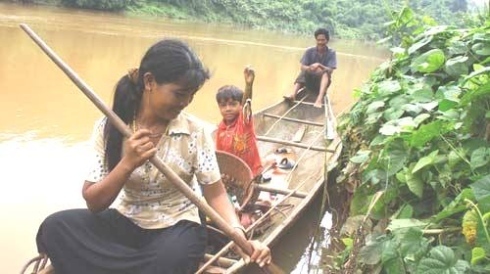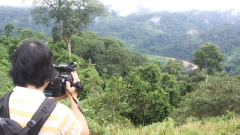
The National Committee for the Man and Biosphere Program (MAB) in Vietnam, under UNESCO, has proposed that the country stop two hydropower projects in Dong Nai Province; otherwise, it will go against its international commitments, said provincial authorities.
 |
| A part of the green area where the Dong Nai 6 hydropower plant is planned to be built |
The National Committee for the Man and Biosphere Program (MAB) in Vietnam, under UNESCO, has proposed that the country stop two hydropower projects in Dong Nai Province; otherwise, it will go against its international commitments, said provincial authorities.
Nguyen Thanh Tri, deputy chairman of the provincial People’s Committee, said the local authorities have received a statement from the MAB in which the agency asked the committee to request competent Vietnamese agencies to stop building the Dong Nai 6 and 6A hydropower plants in the core area of the Dong Nai Biosphere Reserve.
“If Vietnam goes ahead with these hydropower projects, it will not be in line with its international commitments,” MAB said in the statement.
The Dong Nai Biosphere Reserve was recognized by UNESCO as the world’s 580th biosphere reserve on June 28, 2011 and has been highly valued by local and foreign scientists in terms of biological diversity, historical tradition and cultural space.
The recognition was partly based on the province’s prestige and commitments related to the reserve, 80 percent of which is located in the province and is under the management of the local government.
The development orientation of the biosphere reserve is based on the harmony between conservation and development, but the building of two hydropower plants there will have a negative impact on biological diversity, historical and cultural values, and the livelihoods of local people, MAB said.
While the Vietnamese Government and National Assembly are considering the impactthe two projects may have on the environment, the province should remind them of the international commitments to which Vietnam is a party.
The Dong Nai Biosphere Reserve is expected to contribute to building “a green economy and a green society” with a global scale, as recommended by UNESCO at its recent summit in Brazil.
Meanwhile, Vietnam is building the strategic framework for the 2011- 2021 MAB program.
Therefore, if the hydropower projects are continued, this biosphere reserve will suffer the following impacts: the habitats of species will be divided and isolated, the landscape will be segmented, the ecological connectivity will be broken, and the ecological systems will be upset.
And if this is the case, Vietnam will not be able to report to the network of international biosphere reserves about its decade of biological diversity (2010-2020) citing this world biosphere reserve as an example.
 |
| A family lives on the bank of the Dong Nai River, where the Dong Nai 6 hydropower plant is planned to be built. |
More harm than good
In talking with Tuoi Tre about the UNESCO recommendation, Tri said, “We entirely agree with their opinions. Right after receiving the statement from Unesco, we replied that we strongly object to the building the of two hydropower plants. We also sent them the copies of the proposals by the provincial Party Committee and People’s Committee to the Politburo and Prime Minister Nguyen Tan Dyung requesting a halt to these projects.”
“The projects will give more electricity to the country, but they will cause unforeseen damage to the downstream areas, the environment, and the life of local residents,” Tri said.
“The short-term benefits from these projects are very small, while their negative impacts are large in the long run.”
Le Hong Phuong, secretary of the provincial Party Committee, told Tuoi Tre that not only Dong Nai residents, but also millions of other people living downstream on the Dong Nai River want the projects to be stopped.
Meanwhile, the Environment General Department under the Ministry of Natural Resources and Environment yesterday said the ministry has requested that the projects’ owner review and perfect their environmental impact assessment report for the 6 and 6A hydropower plants before the ministry can verify and evaluate the report.
As explained on UNESCO’s website, the Man and the Biosphere (MAB) Program is an Intergovernmental Scientific Program aimed at setting up a scientific basis for the improvement of the relationship between people and their environment globally.
Launched in the early 1970s, the MAB Program proposes an interdisciplinary research agenda and capacity building that targets the ecological, social and economic dimensions of biodiversity loss and the reduction of this loss. Its World Network of Biosphere Reserves currently contains 610 biosphere reserves in 117 countries.
The main MAB governing body, the International Co-ordinating Council of the Man and the Biosphere (MAB) Program, usually referred to as the MAB Council or ICC, consists of 34 Member States elected by UNESCO's biennial General Conference.
(Source:TTNews)



